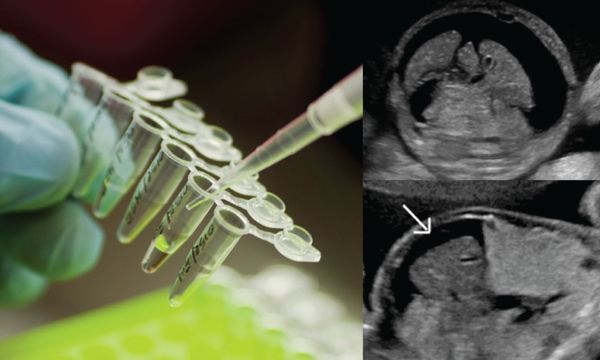Condition studied: non-immune hydrops fetalis (NIHF)
Contact the study team: hydrops@ucsf.edu or 1-800-RX-FETUS
What is hydrops?
Hydrops fetalis is a condition in pregnancy marked by abnormal collections of fluid in the developing fetus. There are two types of hydrops. One is immune in nature and results from blood type incompatibility between the pregnant woman and fetus. The other type is non-immune hydrops fetalis, which results from many types of genetic abnormalities as well as other causes. The majority of hydrops cases today are non-immune, and this is the condition that we are studying.
Who Are We?
The HyDROPS research group is a multidisciplinary team of researchers who work closely and collaboratively to improve the outcomes for pregnancies with non-immune hydrops. Our expertise spans Perinatology, Clinical Genetics, Pediatric Surgery, Bioinformatics, Bioethics, and many other subspecialties. Our Perinatologists and Geneticists have exceptional expertise with cutting-edge testing for hydrops and the clinical management of this condition. The UCSF Genomic Medicine Laboratory, which performs genetic sequencing for our studies, works closely and iteratively with our clinical team to consider the unique features of each case and to report the most accurate results. In addition to the conventional management and treatment of hydrops, the Fetal Treatment Center is home to an array of clinical trials for novel fetal therapies to improve outcomes for pregnancies with hydrops (including in utero enzyme replacement therapy and stem cell transplantation). Together, our team takes a comprehensive approach for each unique case of non-immune hydrops to provide the most thorough information and clinical care that is possible for each family.
Why is our work important?
Identifying the underlying cause of non-immune hydrops is essential to provide the best care for pregnancies with this condition. With a diagnosis, providers can provide more focused care during the pregnancy, guide patients to both conventional prenatal treatments and cutting-edge clinical trials available at UCSF, prepare for the emergent needs of the newborn, and accurately estimate the chance that hydrops will occur in a future pregnancy.
However, standard-of-care testing frequently does not determine the cause of non-immune hydrops. Deeper investigation through the expertise of our team with genomic sequencing, detailed imaging, and other testing, can yield a diagnosis where standard testing falls short (Sparks, et al). Our ongoing research applies emerging genomic techniques to identify even more causes of non-immune hydrops as well as new approaches for fetal treatments to improve outcomes during pregnancy and after birth.
What studies are we currently doing?
We are offering whole genome sequencing to patients whose pregnancies are affected by non-immune hydrops. We are primarily enrolling patients from:
- UCSF
- University of California San Diego
- University of Pennsylvania
- Johns Hopkins Hospital John Hopkins Hydrops Study
- Montefiore Medical Center
For patients seeking care from a center that specializes in non-immune hydrops but live at a distance, the UCSF Hydrops Center of Excellence offers telehealth services.
Webinar: Genetic Diseases Linked to Nonimmune Hydrops, Distinctions in Diagnosis and Prognosis
Study Team

Teresa Sparks, MD, MAS
Maternal-Fetal Medicine and Clinical Genetics
Principal Investigator
Teresa.Sparks@ucsf.edu

Mary Norton, MD
Maternal-Fetal Medicine and Clinical Genetics
Co-Principal Investigator
Mary.Norton@ucsf.edu

Billie Lianoglou, MS, LCGC
Genetic Counselor
Billie.Lianoglou@ucsf.edu
Katie Tick
Clinical Research Coordinator
katie.tick@ucsf.edu
Nuriye Sahin-Hodoglugil
Program Manager
nuriye.sahin-hodoglugil@ucsf.edu
Selected Publications
Rothschild HT, Lianoglou BR, Sahin Hodoglugil NN, Tick K, Brown JEH, Sparks TN. Trust in prenatal exome sequencing for expectant families facing unexplained fetal anomalies. Prenat Diagn. 2023 Dec 29. (PubMed)
Sahin-Hodoglugil NN, Lianoglou BR, Ackerman S, Sparks TN, Norton ME. Access to prenatal exome sequencing for fetal malformations: A qualitative landscape analysis in the US. Prenat Diagn. 2023 Oct;43(11):1394-1405. (PubMed) (PubMed Central)
Swanson K, Norton ME, Downum SL, Gonzalez-Velez JM, Sparks TN. Understanding Preterm Birth in Pregnancies Complicated by Nonimmune Hydrops Fetalis. Am J Perinatol. 2023 07; 40(9):917-922. (PubMed) (PubMed Central).
Avram CM, Caughey AB, Norton ME, Sparks TN. Cost-Effectiveness of Exome Sequencing versus Targeted Gene Panels for Prenatal Diagnosis of Fetal Effusions and Non-Immune Hydrops Fetalis. Am J Obstet Gynecol MFM. 2022 11; 4(6):100724. (PubMed) (PubMed Central).
Swanson K, Norton ME, Lianoglou BR, Jelin AC, Hodoglugil U, Van Ziffle J, Devine P, Sparks TN. The utility of pathologic examination and comprehensive phenotyping for accurate diagnosis with perinatal exome sequencing. Prenat Diagn. 2022 09; 42(10):1288-1294. (PubMed) (PubMed Central).
Swanson K, Sparks TN, Lianoglou BR, Chen F, Downum S, Patel S, Rego S, Yip T, Van Ziffle J, Koenig BA, SlavotinekAM, Norton ME. Preference for secondary findings in prenatal and pediatric exome sequencing. Prenat Diagn. 2022 05; 42(6):753-761. (PubMed) (PubMed Central).
Norton ME, Ziffle JV, Lianoglou BR, Hodoglugil U, Devine WP, Sparks TN. Exome sequencing vs targeted gene panels for the evaluation of nonimmune hydrops fetalis. Am J Obstet Gynecol. 2022 01; 226(1):128.e1-128.e11. (PubMed) (PubMed Central)
Mone F, Eberhardt RY, Hurles ME, Mcmullan DJ, Maher ER, Lord J, Chitty LS, Dempsey E, Homfray T, Giordano JL, Wapner RJ, Sun L, Sparks TN, Norton ME, Kilby MD. Fetal hydrops and the Incremental yield of Next-generation sequencing over standard prenatal Diagnostic testing (FIND) study: prospective cohort study and meta-analysis. Ultrasound Obstet Gynecol. 2021 Oct; 58(4):509-518. (PubMed) (PubMed Central).
Sparks TN, Lianoglou BR, Adami RR, Pluym ID, Holliman K, Duffy J, Downum SL, Patel S, Faubel A, Boe NM, Field NT, Murphy A, Laurent LC, Jolley J, Uy C, Slavotinek AM, Devine P, Hodoglugil U, Van Ziffle J, Sanders SJ, MacKenzie TC, Norton ME. Exome Sequencing for Prenatal Diagnosis in Nonimmune Hydrops Fetalis. N Engl J Med 2020, Oct; 383:1746-1756. (NEJ)
Kilby, Mark D. Nonimmune Hydrops Fetalis — More Than Meets the Eye? N Engl J Med 2020 Oct; 383:1785-1786. (NEJ)
Mardy AH, Rangwala N, Hernandez-Cruz Y, Gosnell KA, Gonzalez JM, Norton ME, Sparks TN. Utility of chromosomal microarray for diagnosis in cases of nonimmune hydrops fetalis. Prenat Diagn 2020 Mar; 40(4):492-496. (PubMed) (PubMed Central)
Sparks TN, Thao K, Lianoglou BR, Boe NM, Bruce KG, Datkhaeva I, Field NT, Fratto VM, Jolley J, Laurent LC, Mardy AH, Murphy AM, Ngan E, Rangwala N, Rottkamp CAM, Wilson L, Wu E, Uy CC, Valdez Lopez P, Norton ME on behalf of the University of California Fetal-Maternal Consortium (UCfC). Nonimmune hydrops fetalis: identifying the underlying genetic etiology. Genet Med 2019 Jun; 21(6):1339-1344. (PubMed) (PubMed Central)
Mardy AH, Chetty SP, Norton ME, Sparks TN. A system-based approach to the genetic etiologies of non-immune hydrops fetalis. Prenat Diagn 2019 Aug; 39(9):732-750. (PubMed) (PubMed Central)
Berger VK, Sparks TN, Jelin AC, Derderian C, Jeanty C, Gosnell K, MacKenzie T, Gonzalez JM. Non-immune hydrops fetalis: Do placentomegaly and polyhydramnios matter? J Ultrasound Med 2018 May; 37(5):1185-1191. (PubMed) (PubMed Central)
Study Sponsors
We appreciate the funding support from the Brianna Marie Foundation in collaboration with the Fetal Health Foundation, the National Institutes of Health, UCSF, and Raina's Activity Chest.
